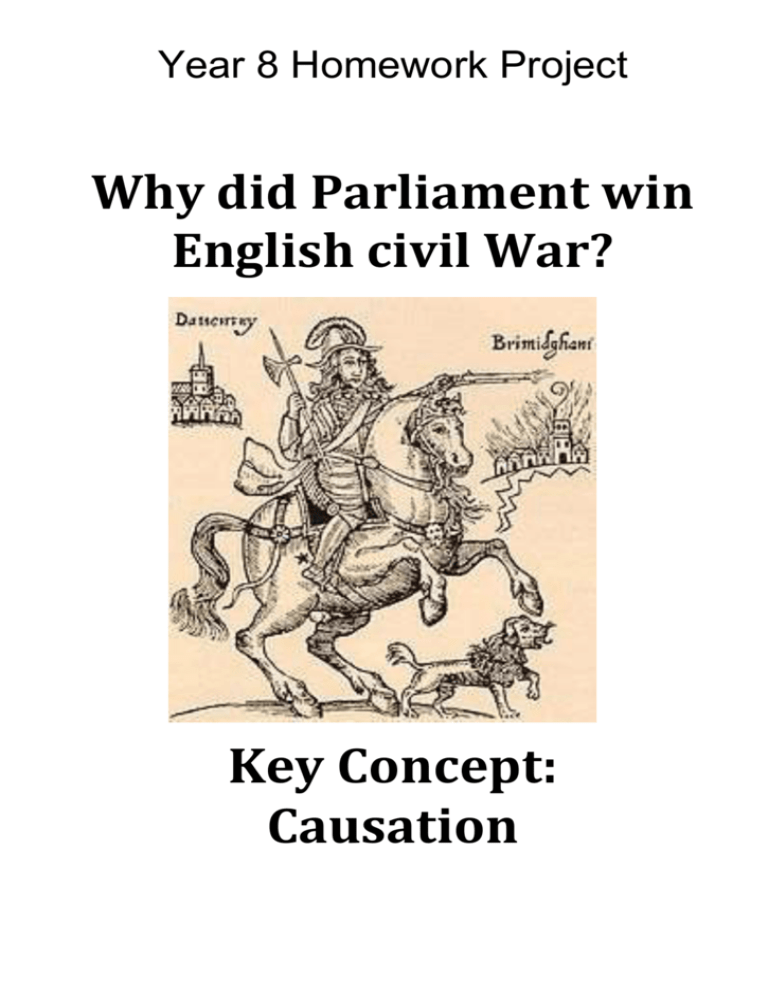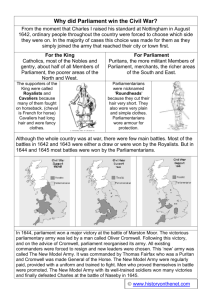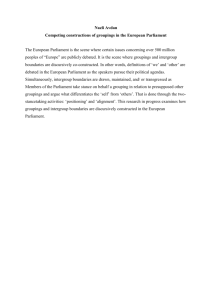Why did Parliament win the English Civil War?
advertisement

Year 8 Homework Project Why did Parliament win English civil War? Key Concept: Causation Introduction Welcome to your First homework project of Year 8. This project is about the English Civil War and why Parliament won. By the end of this project you should be able to: (1) Describe some of the key battles that took place during the war (2) Explain some of the reasons why Parliament won the war (3) Decide what you think the most important reason was for Parliament’s victory To achieve this you have to complete three tasks. Task 1 Research what happened during the following battles: Edgehill, October 1642 Marston Moor, July 1644 Newbury, October 1644 Naseby, June 1645 As you are researching you should complete the table provided to help you work out which side had the better army. Task 1 table: Royalist Army Strengths Weaknesses Parliamentarian Army Task 2 a) Read the information boxes about why Parliament won the English Civil War (on the last page) b) Make a key to colour the boxes to show the following reasons: Leadership skills Tactics and decisions Military (army) strength/weakness Be careful! Some of the boxes may show more than one reason! Task 3 You are going to write an answer to the question: ‘Why did Parliament win the English Civil War?’ In this answer you should include: What you think was the most important reason Examples to prove this reason At least one more additional reason A conclusion that thinks about whether Parliament won due to their own achievements or the failures of the King? You can use the following writing frame to help you if you want: (on the next page) The English Civil War broke out in 1642 because… The most important reason Parliament won the war was because… This is shown in the example when… This was the most important reason for their victory because… Another reason why Parliament won the Civil War was because… For example when… In conclusion, I think Parliament won the war because… Where can I find information? You can use the books in the LRC or try some online research at the following websites: http://www.historyonthenet.com/Civil_War/civil_war_battles.htm http://www.historylearningsite.co.uk/battles_english_civil_war.htm http://www.battlefieldstrust.com/resource-centre/civil-war/ or you could even watch the Battlefield Britain episode dedicated to the English Civil War! Ask you history teacher for more details. Information boxes for Task 2 Parliament created the New Model Army which was better organised and trained than the king’s army, though it did lack experience. In the Battle of Naseby, Oliver Cromwell used clever tactics to defeat the king’s army, such as hiding his cavalry behind a row of hedges. Parliament controlled the areas with the most money, such as London. Though both sides did it, a lack of money meant the king’s army had to steal food which made them unpopular. The New Model Army would pray for victory together which made them more loyal to one another. There was strict Parliament’s army religious discipline fought harder as in Parliament’s they believed they army: if anyone were fighting for swore they God. severely punished. Several commanders believed that removing the King was important as he was a tyrant. Parliament controlled East Anglia which produced the best horses – and so the best cavalry – in the country. Oliver Cromwell was in charge of these. The king made some tactical errors, such as splitting up his army before the Battle of Naseby. Having more money meant troops could be paid more and soldiers given better weapons. Parliament controlled the navy, meaning they controlled all trade coming in to the country.







